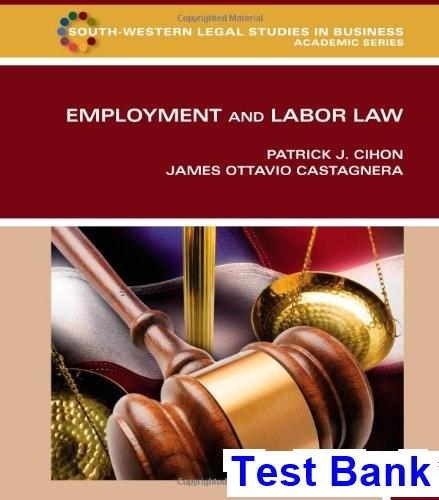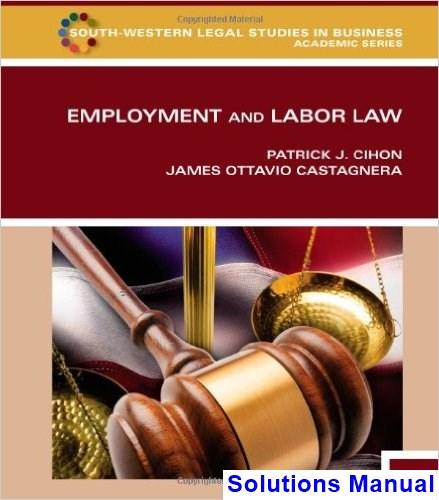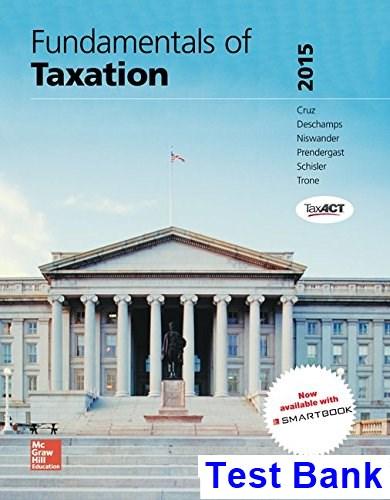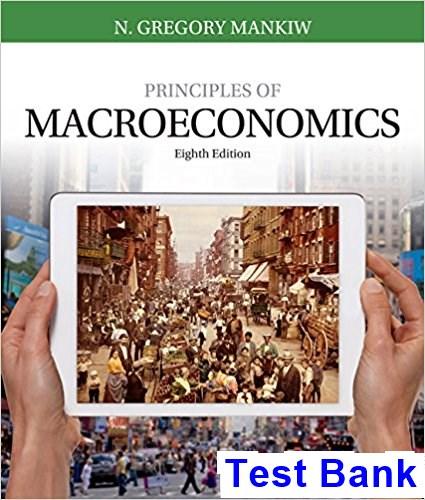TEST BANK
Chapter 8
DISCRIMINATION BASED ON RELIGIONAND NATIONALORIGIN & PROCEDURES UNDER
True/False Questions
1. Title VII of the Civil RightsAct of 1964 prohibits employment discrimination on the basis of religion.
ANSWER: T
2. An employer who is providing helicopter pilots under contract to the Saudi Arabian government to fly Muslim pilgrims to Mecca could refuse to hire non-Muslims or require all pilots to convert to Islam.
ANSWER: T
3. While seeking accommodation, an employee is required to act reasonably in considering the alternative means of accommodation that is available.
ANSWER: T
4. Title VII does not currently prohibit employment discrimination against any applicant or employee because of national origin.
ANSWER: F
5. Title VII does not allow employers to hire employees of a particular ethnic or national origin even if based on legitimate business, safety, or security concerns.
ANSWER: F
6. The EEOC enforces federal laws prohibiting employment discrimination.
ANSWER: T
7. The Immigration Reform and ControlAct of 1986 (IRCA) prohibits employment discrimination because of national origin or citizenship against applicants or employees, including illegal aliens.
ANSWER: F
8. Under Title VII, the federal government has exclusive authority over employment discrimination issues.
ANSWER: F
9. If the EEOC dismisses a complaint or decides not to file suit, it notifies the complainant that he or she may file suit on his or her own.
ANSWER: T
10. An employee is given 160 days to file complaint with the EEOC under the Lilly Ledbetter Fair PayAct
ANSWER: F
11. The plaintiff, in a suit under Title VII, always carries the burden of proof
© 2011 Cengage Learning.All Rights Reserved. May not be scanned, copied or duplicated, or posted to a publicly accessible website, in whole or in part.
ANSWER: T
12. Unions and employers generally agree that any dispute arising under their collective agreements will be settled through arbitration.
ANSWER: T
13. Individual employees, even those in supervisory or managerial positions, are personally liable under Title VII.
ANSWER: F
14. Section 706(g) provides that no backpay order shall extend to a period prior to one year before the date of the filing of a complaint with the EEOC.
ANSWER: F
15. The rules of procedure for the federal courts allow an individual plaintiff to sue on behalf of a whole class of individuals allegedly suffering the same harm.
ANSWER: T
Multiple Choice Questions
1. Government action involving religion raises issues under the __________ of the U.S. Constitution.
a. ThirdAmendment
b. First Amendment
c. FifthAmendment
d. FourthAmendment
ANSWER: (b)
2. Title VII includes religion within the BFOQ exception enumerated in:
a. Section 703(d) (2).
b. Section 703(d) (1).
c. Section 702(d) (2).
d. Section 703(e) (1).
ANSWER: (d)
3. The judgment of the court in Corporation of the Presiding Bishop of the Church of Jesus Christ of Latter-day Saints v. Amos, in which plaintiffs brought action against the CPB and the COP alleging, among other things, discrimination on the basis of religion in violation of the Civil RightsAct of 1964, was:
a. upheld.
b. reversed.
c. remanded.
d. dismissed.
ANSWER: (c)
4. Section 702(a) provides an exception under Title VII to all:
a. religious associations.
b. non-profit institutes.
c. corporate houses.
d. international organizations.
ANSWER: (a)
2011 Cengage Learning.All Rights Reserved. May not be scanned, copied or duplicated, or posted to a publicly accessible website, in whole or in part.
5. When an employer is not within the exemption provision of Section 702 under Title VII, and the religion is not a BFOQ, the prohibition against discrimination on the basis of religion is:
a. absolute.
b. obsolete.
c. not absolute.
d. unconditional.
ANSWER: (c)
6. Identify the case in which the Court ofAppeals held that the employer had committed an unlawful employment practice under Section 703(a) (1) of theAct.
a. Trans World Airlines v. Harry
b. Atkinson Airlines v. Hudson
c. Starbucks Airlines v. Hardsen
d. Trans World Airlines v. Hardison
ANSWER: (d)
7. The decision of the U.S. Court ofAppeals for the Third Circuit in Webb v. City of Philadelphia, in which Officer Webb filed a complaint of religious discrimination under Title VII with the Pennsylvania Human Relations Commission and the federal Equal Employment Opportunity Commission, stated that:
a. uniform requirements were crucial to the safety of officers.
b. an accommodation would cause an undue hardship on the employees.
c. the strict enforcement of Directive 78 was not essential to the values of impartiality, religious neutrality and uniformity.
d. some employees may find a co-worker’s exercise of his or her religious beliefs offensive.
ANSWER: (a)
8. Which section of Title VII states that it is not a violation if an employer refuses to hire or to discharge an employee who is unable to meet the requirements for a national security clearance where federal law or regulations require such a clearance for the job in question?
a. Section 703(a)
b. Section 703(f)
c. Section 703(e)
d. Section 703(g)
ANSWER: (d)
9. In which of the following cases did the EEOC argue that the district court erred in each respect of the decision and finally appealed to the U.S. Court ofAppeals for the Fifth Circuit?
a. Equal Employment Opportunity Commission v. City of Arlington
b. Equal Employment opportunity Committee v. Earnest & Young Enterprises, Inc.
c Equal Employment Opportunity Commission v. WC&M Enterprises, Inc.
d. Equal Employment Opportunity Committee v. E &M Enterprise, Inc
ANSWER: (c)
10. The EEOC enforces prohibiting employment discrimination
a. state laws
b. regional laws
c. community laws
d. federal laws
ANSWER: (d)
11. In Garcia v. Spun Steak Company, where the employees and the union filed suit against Spun Steak, alleging that the English-only policy violated Title VII, the court ofAppeals:
a. dismissed the trial court judgment.
b. remanded the trial court judgment.
c. reversed the trial court judgment.
d. enforced the trial court judgment.
ANSWER: (c)
12. Ron and Roderick were American employees at a publishing firm. The company employed 22 workers, most of who were French or spoke French. There were constant complaints pertaining to language issues by Ron and Roderick. The company subsequently adopted an “English-only” policy, requiring employees to speak in English while conducting business. The French employees and the union then filed a lawsuit against the company, alleging that the English-only policy violated Title VII. In this case, the court held that there was no violation of Title VII because:
a. there wasn’t enough evidence that the rule was actually implemented.
b. there were no reasonable grounds to justify that provisions of Title VII were violated.
c. there were not a sufficient number of employees to support the union.
d. there were a large number of English speaking employees in the company.
ANSWER: (b)
13. Employers are allowed to refuse to hire applicants who are denied national security clearances for positions subject to federal security requirements under:
a. Section 703(g) of Title VII.
b. Section 703(e) of Title VII.
c. Section 704(e) of Title VII.
d. Section 703(f) of Title VII.
ANSWER: (a)
14. The Immigration Reform and ControlAct was enacted in the year:
a. 1889.
b. 1986.
c. 1898.
d. 1978.
ANSWER: (b)
15. Unlike the National Labor RelationsAct, Title VII does not give exclusive authority over employment discrimination issues to:
a. local governments.
b. state authorities.
c. employers.
d. the federal government.
ANSWER: (d)
16. Dorothy filed a complaint with the EEOC against her employer alleging sex-based discrimination. The complaint can be filed with the EEOC:
a. within 300 days of occurrence of the act.
b. only if the company is registered with the EEOC.
c. which will be immediately sent to the district court.
d. prior to filing the complaint with a state or local agency
ANSWER: (a)
17. Mohammed worked in a garment manufacturing firm. He was a new immigrant from Afghanistan and due to the terrorist activities in his country he faced several discrimination issues at his place of work. He was subjected to humiliation and verbal abuse, and subsequently he was physically assaulted by his co-workers a few blocks from the company premises. He filed a suit under Title VII alleging racial discrimination by co-workers and his employers. To establish a prima-facie case he should present the court with:
a. enough evidence to raise a presumption of discrimination
b. written notice from the federal government allowing him to sue his employers.
c. written notice from the state government allowing him to sue his employers and coworkers.
d. direct evidence to raise the mixed-motive analysis under Section 702(m).
ANSWER: (a)
18. In McDonnell Douglas Corp. v. Green, the respondent (Green) filed a formal complaint with the Equal Employment Opportunity Commission, claiming that the petitioner had refused to rehire him because of his race, and persistent involvement in the civil rights movement which were in violation of Sections 703(a)(1) and 704 (a). How would Green claim a case of discrimination?
a. By clause of arbitration
b. By establishing a prima-facie case
c. By establishing suo-moto case
d. By collective bargaining
ANSWER: (b)
19. One way to establish proof of a disproportionate impact is by using the:
a. Four-Fifth Rules from the NLRB guidelines.
b. Four-Fifth Rules from the IRCAGuidelines.
c. Four-Fifths Rule from the EEOC Guidelines.
d. Lilly Ledbetter Fair PayAct Guidelines.
ANSWER: (c)
20. The Federal ArbitrationAct (FAA) requires federal courts to enforce agreements to arbitrate if they:
a. pertain to railroad employees, or any other class of workers engaged in foreign or interstate commerce.
b. are voluntary and knowing.
c. do not place undue hardship on the parties.
d. were not knowingly agreed to.
ANSWER: (b)
21. Luke was selected for the post of junior manager in a five-star hotel. The employer’s application for employment contained a Dispute ResolutionAgreement requiring employees to submit all employment disputes to binding arbitration.Applicants who refused to sign the Dispute ResolutionAgreement were not hired. Such an agreement is:
a. not enforceable under the FAA, as held by the district court.
b. not enforceable under the FAA, as held by the Supreme court.
c. enforceable under the FAA, as held by the Supreme court.
d. enforceable under the FAA, as held by the district court.
ANSWER: (c)
22. Awarding of back pay and seniority is a:
a. principle reversed by the Supreme court.
b. remedy under Title VII
or
or











